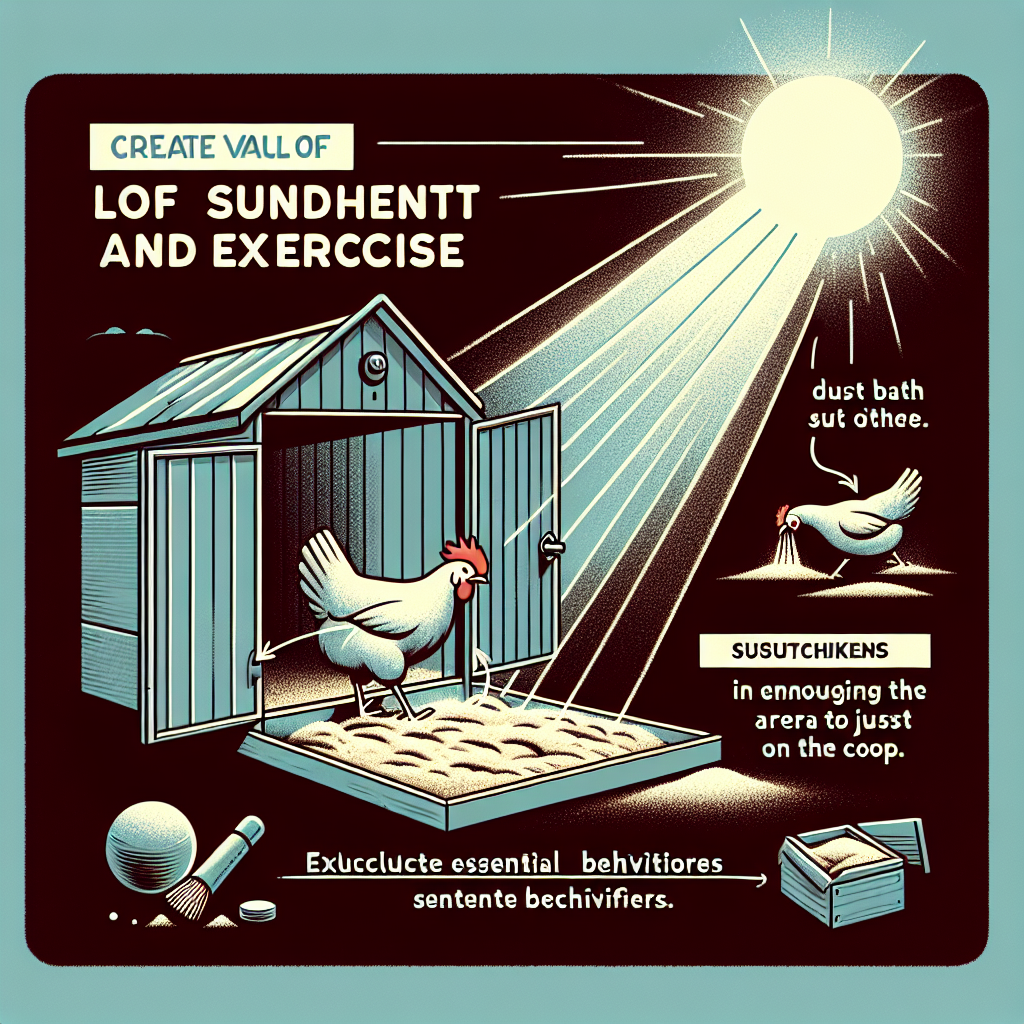If you’re a proud owner of chickens, ensuring that they receive adequate sunlight and exercise is crucial for their overall health and well-being. But how exactly can you make sure your feathered friends are getting the right amount of sunlight and exercise? In this article, we will explore some practical tips and ideas that will help you create the perfect environment for your chickens to thrive. From designing a chicken coop with sufficient outdoor space to encouraging natural scratching and foraging behavior, we’ve got you covered with all the information you need to keep your chickens happy and healthy.
Creating a Suitable Outdoor Space
Creating a suitable outdoor space for your chickens is essential to their overall health and well-being. Designing a chicken run is the first step in providing them with a safe and secure area to roam and explore. When designing the chicken run, it is important to consider factors such as the size and type of fencing, as well as the overall layout and aesthetics.
Designing a Chicken Run
When designing a chicken run, it is important to consider the needs of your chickens. Think about the size of your flock and how much space they will need to move around comfortably. Ideally, each chicken should have at least 10 square feet of space in the run. This will ensure that they have enough room to exercise, flap their wings, and engage in natural behaviors.
Choosing the Right Size
Choosing the right size for your chicken run is crucial. As mentioned earlier, each chicken should have at least 10 square feet of space. However, if you have a larger flock or if your chickens are confined to the run for extended periods, you may want to consider providing more space. It is also important to consider the size of your backyard or outdoor area when determining the size of the chicken run.
Installing Fencing for Security
Installing fencing around the chicken run is essential for keeping your chickens safe. It will not only keep predators out but also prevent your chickens from wandering off. When choosing fencing, opt for sturdy materials such as galvanized wire mesh or hardware cloth. Make sure the fencing is buried at least a foot deep to prevent predators from digging under it. Additionally, consider adding a roof or netting to protect your chickens from aerial predators.
Utilizing Natural Sunlight
Providing your chickens with access to natural sunlight is crucial for their overall health. Sunlight not only provides them with essential vitamins but also helps regulate their internal clocks and promotes natural behaviors such as dust bathing and foraging.
Positioning the Chicken Coop
When positioning the chicken coop, consider the path of the sun throughout the day. Ideally, you want to place the coop in an area that receives maximum sunlight. Avoid areas with excessive shade as this can limit the amount of sunlight your chickens receive. If possible, position the coop in a way that allows the sunlight to directly enter the coop during certain times of the day.
Providing Access to Sunlit Areas
In addition to positioning the chicken coop for optimum sunlight, it is also important to provide your chickens with access to sunlit areas within their outdoor space. This can be achieved by designing the chicken run in a way that allows sunlight to penetrate different areas throughout the day. Consider adding windows or doors that can be opened to let in sunlight, and create spaces within the run where your chickens can bask in the sun.
Supplementing Artificial Light
While natural sunlight is ideal for your chickens, there may be instances where supplementing with artificial light becomes necessary. This is particularly important during the winter months when daylight hours are limited. Having adequate lighting in the chicken coop will help maintain the chickens’ circadian rhythm and stimulate natural behaviors such as egg production.
Understanding the Need for Artificial Light
It is important to understand the need for artificial light in order to provide the right amount of supplemental lighting for your chickens. Chicken’s natural reproductive cycle is largely influenced by daylight hours. In order to maintain regular egg production, most chickens require a minimum of 14 hours of light per day. It is recommended to gradually increase or decrease the amount of light based on the specific needs of your flock.
Installing a Lighting System
To supplement natural sunlight, you can install a lighting system in the chicken coop. LED lights are a popular choice as they are energy-efficient and provide a balanced spectrum of light similar to natural sunlight. Place the lights at a height that mimics the position of the sun during the day. It is important to regularly monitor the lighting system to ensure it is functioning properly and providing the necessary lighting for your chickens.
Encouraging Natural Exercise
Ensuring that your chickens have opportunities for natural exercise is essential for their overall health and well-being. Allowing them to engage in activities such as free-ranging, perching, and navigating obstacle courses not only keeps them physically active but also promotes mental stimulation.
Allowing Free Range
Allowing your chickens to free-range is one of the best ways to encourage natural exercise. This allows them to explore their environment, forage for insects and plants, and engage in natural behaviors such as dust bathing. However, it is important to supervise them during free-range time to ensure their safety and protect them from predators.
Adding Perches and Roosting Bars
Providing perches and roosting bars in the chicken coop is another way to encourage natural exercise. Chickens naturally seek out elevated areas to perch and roost. By adding perches and roosting bars at various heights and angles, you are providing them with opportunities to exercise their wings, maintain balance, and engage in natural behaviors.
Creating Obstacle Courses
Creating obstacle courses within the chicken run is a fun and creative way to encourage exercise and mental stimulation. You can incorporate various elements such as ramps, tunnels, and hurdles to create a stimulating environment for your chickens. Obstacle courses not only provide exercise but also promote problem-solving skills and enhance coordination.
Using Toys and Treats
Toys and treats are great tools to keep your chickens entertained and mentally stimulated. They not only provide a source of enrichment but also encourage natural behaviors such as pecking, scratching, and exploring.
Introducing Chicken Toys
There are a variety of toys available that can be introduced to your chickens. Puzzle feeders, hanging treats, and swinging perches are just a few examples of toys that can be used to keep your chickens entertained. When introducing toys, observe your chickens’ reactions and preferences. Some chickens may enjoy pecking and scratching at certain toys, while others may prefer toys that provide a challenge or reward.
Offering Enriching Treats
Enriching treats can also be used to provide mental stimulation and reward your chickens for good behavior. Treats such as mealworms, fruits, and vegetables can be scattered throughout the chicken run or placed in treat dispensers to encourage foraging and pecking. It is important to offer treats in moderation to maintain a balanced diet for your chickens.
Regular Interaction and Handling
Regular interaction and handling are important aspects of chicken care. Spending time with your chickens not only strengthens the bond between you and your flock but also helps socialize them, making them more friendly and comfortable around humans.
Spending Time with Your Chickens
Make it a habit to spend quality time with your chickens on a regular basis. This can involve sitting in their outdoor space, observing their behavior, and offering them gentle interactions. Talking to your chickens in a calm and friendly tone can help establish trust and familiarity.
Handling and Foraging Training
Handling your chickens is not only beneficial for their socialization but also for their health. Regularly handling them can help detect any abnormalities or injuries and allows you to check their overall well-being. Additionally, you can train your chickens to forage by scattering treats or feed in various areas, encouraging them to explore and engage in natural behaviors.
Designing a Chicken-friendly Coop
A chicken-friendly coop is essential for providing a safe and comfortable environment for your flock. Consider factors such as space, ventilation, and amenities when designing or choosing a coop for your chickens.
Providing Adequate Space
When designing a chicken coop, it is important to provide adequate space for your flock. Each chicken should have a minimum of 4 square feet of coop space. This allows them to move around comfortably and engage in natural behaviors such as nestling, perching, and laying eggs. It is also crucial to provide at least 8 inches of roosting space per chicken.
Ensuring Proper Ventilation
Proper ventilation is essential in a chicken coop to maintain good air quality and prevent the build-up of moisture and ammonia. Adequate ventilation helps regulate temperature, reduces the risk of respiratory diseases, and promotes overall chicken health. Consider installing windows, vents, or exhaust fans to ensure proper airflow within the coop.
Including Dust Bathing Areas
Chickens naturally engage in dust bathing to keep their feathers clean, control parasites, and cool down. Including a designated area for dust bathing within the coop or run is important. This can be as simple as a shallow container filled with sand, fine dirt, or wood ash. Provide enough space for your chickens to comfortably lie down and roll in the dust.
Monitoring and Assessing Behavior
Monitoring and assessing the behavior of your chickens is an important part of their care. Regular observation allows you to identify any signs of stress, illness, or abnormal behavior.
Observing Chicken Behavior
Take the time to observe your chickens’ behavior on a daily basis. Look for signs of normal behavior such as active foraging, social interaction, and contentment. Any changes in behavior, such as lethargy, aggression, or excessive vocalization, should be noted and addressed.
Recognizing Signs of Health and Activity
Healthy chickens exhibit certain signs of well-being. Look for bright, alert eyes, clean feathers, and an active appearance. Active and healthy chickens are usually curious, engaged in their surroundings, and moving around actively. Regular monitoring and recognition of these signs will help you assess the overall health and activity levels of your flock.
Implementing a Daily Routine
Establishing a daily routine is important for maintaining a consistent and healthy environment for your chickens. This routine should include regular feeding, exercise times, and coop maintenance.
Establishing Daily Feeding and Exercise Times
Have a set schedule for feeding and exercise times for your chickens. Consistency is key, as chickens thrive on routine. Provide fresh food and water in the morning and evening, and set aside specific times during the day for supervised free-range or outdoor activities.
Maintaining a Clean and Organized Coop
Regularly maintaining a clean and organized coop is crucial for the health and well-being of your chickens. Remove any soiled bedding, clean food and water containers, and regularly inspect the coop for signs of pests or damage. A clean and organized coop helps prevent the spread of diseases and provides a comfortable living environment for your chickens.
Seeking Veterinary Advice
While providing adequate sunlight, exercise, and a suitable living environment is important, sometimes health issues may arise that require veterinary attention. Regular check-ups and vaccinations are essential for ensuring the long-term health and well-being of your flock.
Consulting a Poultry Veterinarian
It is recommended to consult a poultry veterinarian for regular check-ups and vaccinations for your chickens. A poultry veterinarian can provide guidance on specific health concerns, conduct diagnostic tests, and recommend appropriate treatments or medications.
Vaccinations and Health Checks
Routine vaccinations and health checks are important for preventing and controlling diseases in your flock. Consult with your veterinarian to determine the recommended vaccinations and health protocols for your particular breed of chickens. Regular health checks can help identify any potential health issues early on and ensure the overall health and vitality of your flock.
In conclusion, creating a suitable outdoor space, providing access to natural sunlight, supplementing with artificial light, encouraging natural exercise, using toys and treats, regular interaction and handling, designing a chicken-friendly coop, monitoring behavior, implementing a daily routine, and seeking veterinary advice are all essential aspects of ensuring your chickens are getting adequate sunlight and exercise. By taking these steps and providing a well-rounded and enriching environment for your flock, you can promote their overall health, happiness, and longevity.




